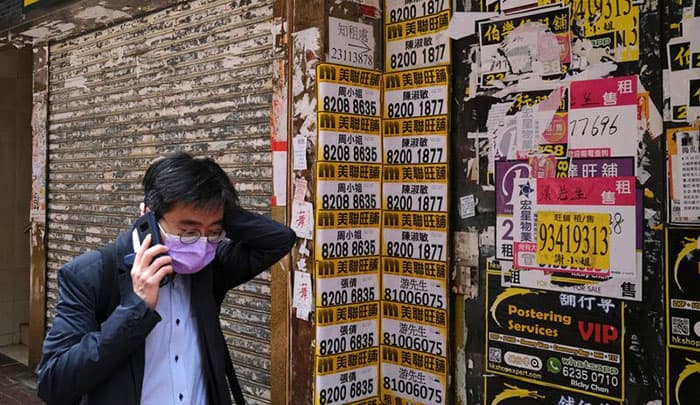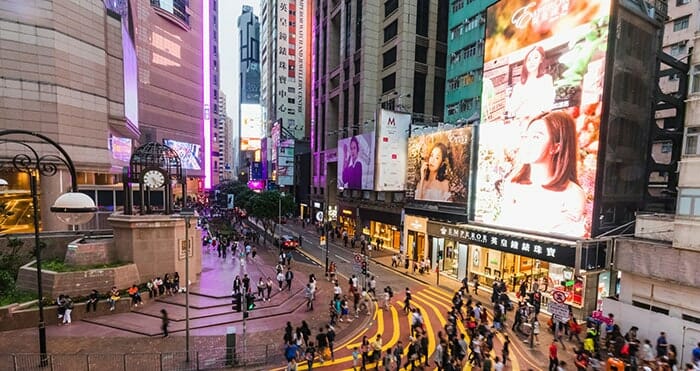
A new COVID-19 wave may shutter more shops in Hong Kong
Hong Kong’s retail property market is bracing for turbulent times as a street front shop in the world’s most expensive shopping district was sold at a 73 percent loss.
According to Land Registry records cited by the Hong Kong Economic Times, the 244 square foot (23 square meter) shop in Causeway Bay was sold for HK$5 million ($650,000) earlier this month, or around HK$20,500 per square foot.
That price was just over a quarter of the HK$18.74 million which the seller had paid to purchase the bedroom-sized property from Chinese Estates Holdings Limited (HKG 0127) seven years ago.
Retail Stores Struggled With Sharp Decline of Visitors
The discount sale came as a number of international retail chains have fled Hong Kong’s famously pricey retail strips in recent months as sales of luxury goods plummet in the face of closed borders and economic gloom.

Martin Wong of Knight Frank
In January, French fashion brand Louis Vuitton opted not to renew a lease in Wharf Holdings Times Square complex in Causeway Bay as the retail space’s HK$5 million ($640,000) per month lease became unsustainable in the face of plunging retail sales.
Last month, the American underwear brand Victoria’s Secret closed its last retail store in Causeway Bay, amid a sharp decline in Hong Kong’s tourism industry and economic losses caused by the pandemic.
Martin Wong, Associate Director at the property consultancy Knight Frank, thinks the current situation in the retail market is a combined result of a structural change in visitor arrivals, social unrest and COVID-19.
“We have the visitor arrival pattern shifting from overnight visits to same-day visits gradually over the years and visitors coming in town to consume more mid-priced products and experience-based services compared to luxury commodities before. These permanent structural changes have led retail rents to drop in the traditional core retail area. The protracted social unrest and COVID-19 only intensify the situation by hurting the overall visitor arrival”, said Wong.
According to the Hong Kong Tourism Board, total visitor arrivals to Hong Kong encountered a historic slump in the first five months of 2020 to total just over 3.5 million — an 88.2 percent decline from the same period in 2019. Visits by travellers from mainland China, which accounted for over 70 percent of total visitors to the city, fell by 88.7 percent — the sharpest rate of any group.
The decline in Hong Kong’s tourism industry has also triggered fire sales of retail assets in formerly bustling shopping districts beyond Causeway Bay.
In March, a store along Nathan Road in Mongkok, normally one of Hong Kong’s busiest retail areas, was sold at a 54 percent discount and notched the worst loss this year for a seller in the 20-storey Ginza-style commercial building.
Tightening Measures Amid a Third Wave

The world’s most expensive shopping strip is losing its appeal
The mini-shop in Causeway Bay had been on the market for three years with an asking price which had held steady at HK$14 million over the period, according to local media reports.
With Hong Kong now grappling to contain a third wave of the COVID-19 pandemic, the owner made a decision to sell for 64 percent less than his hoped for price, as new restrictions on activity were rolled out.
Total new confirmed cases of the coronavirus in Hong Kong surged to 1074 over the last two weeks, after two months of almost no new cases, according to the government health ministry. In response to the new wave of the pandemic, the Hong Kong government announced that it would strengthen epidemic prevention measures, including prohibiting dining in restaurants during certain hours and restricting public gatherings to a maximum of four people.
“The newly imposed epidemic prevention measures are likely to lead to a further drop in retail sales in most segments except supermarkets and other daily necessities”, said Knight Frank’s Wong, “Restaurants receipts will also be adversely impacted as no sit-in is allowed after 6 pm.”
As more consumers begin shifting to e-commerce and making other changes to their consumption habits due to COVID-19, online sales have also presented worries for sellers of luxury goods. “This will be a challenge for all brick-and-mortar retail in different places and not just for Hong Kong, ”said Wong.
Retailers Brace for Turbulent Times
“The overall retail environment will remain difficult in the remainder of 2020 but opportunistic retailers are expected to leverage on falling rents and explore different leasing options”, commented Lawrence Wan, Senior Director at CBRE Hong Kong.
A report released by the property consultancy earlier this month showed that total retail sales in Hong Kong fell nearly 35 percent in the first five months of 2020 with tourist-oriented segments such as watches and jewellery taking the hardest hit with a decline of 67 percent.
Overall vacancies along prime shopping streets climbed to a four-year peak of 13.5 percent, with fashion and luxury retailers generally consolidating their footprints.
The growing number of shuttered shops comes as the COVID-19 crisis has decimated shop owners with a survey released by the Hong Kong Retail Management Association on 16 April revealing that nine out of ten retailers had suffered a “medium to severe” loss as a result of the pandemic.
Only around 40 percent of the retailers participating in the study said at the time that they had the resources to sustain their businesses for a further four more months, while 20 percent indicated that they will run out of cash by the end of the year.
Some of the brands willing to carry on their businesses are finding landlords beginning to back off on rental demands with cosmetics giant Estee Lauder having renewed a lease in Mong Kok at a 46 percent discount from the HK$428,000 per month that it had been paying in the Kowloon neighbourhood, according to Savills.
Leave a Reply